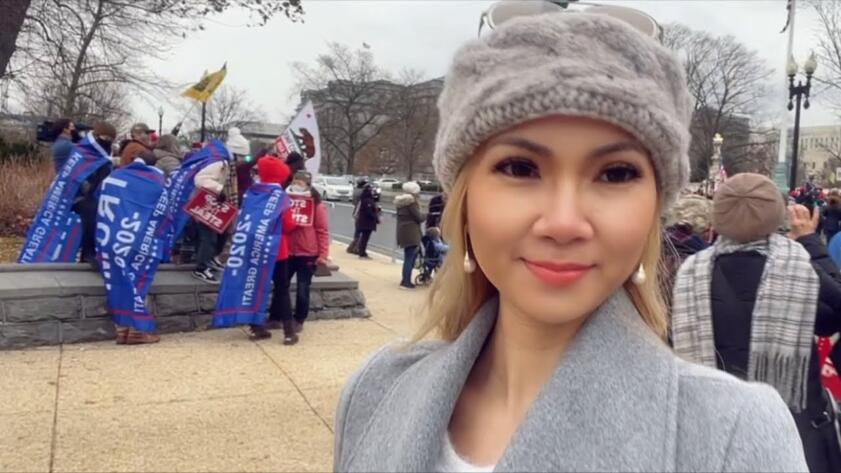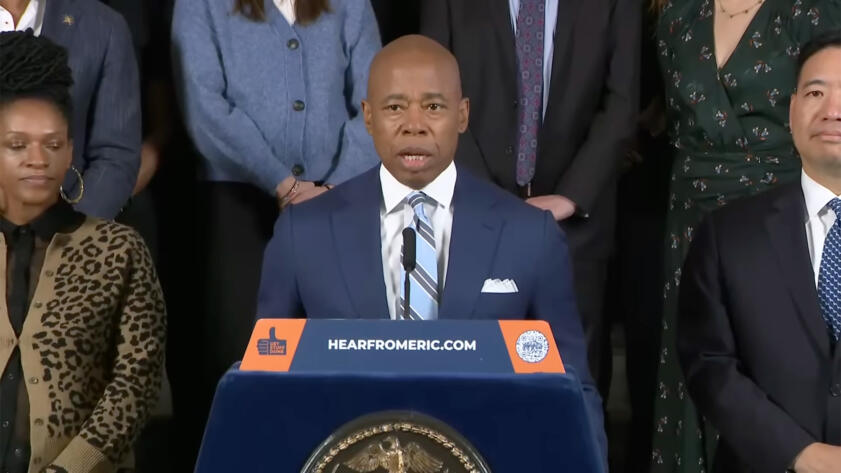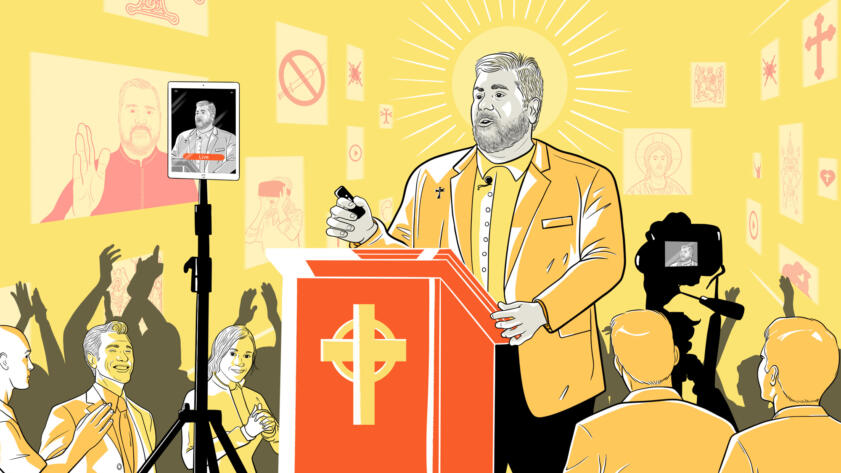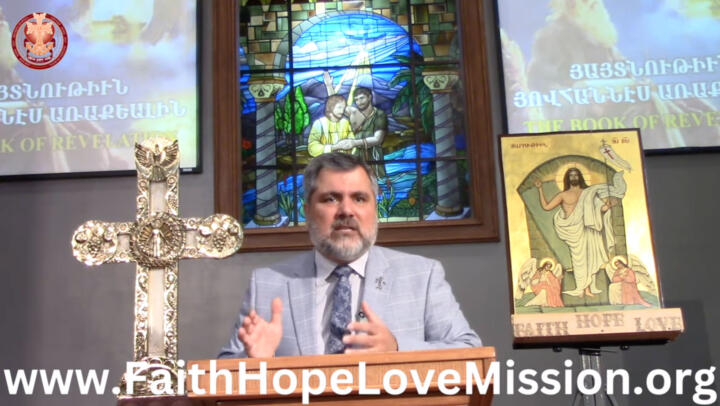Reverend Barthev Gulumian is a charismatic man, with an inviting presence and an ecclesiastical singing voice. He blesses every chatty elderly lady that asks, he speaks eight languages, including Latin and Ancient Greek, and his nonprofit organization, Faith Hope Love Mission, has been “feeding, clothing and comforting the needy” since 2013.
He also has used his popular social media presence to spread QAnon-style vaccine misinformation and conspiracy theories to an audience of religious Armenians in the Los Angeles area and around the world.
“These, [dear friends]/beloved, are the Illuminati; these, dear friends, are the ruling evil powers that have all the world’s money and power in their hands,” Gulumian said in Armenian, part of a sermon he’s given many times. This particular sermon was hosted live on his Faith Hope Love Mission channels—YouTube, Instagram, and Facebook—as recently as last month.
“Eventually, they started forcing on people, what? The vaccine. … The reasons they did this are clear: to poison the population, because the population had increased.”
The Armenian religious community overwhelmingly adheres to the Armenian Orthodox Church, a branch of Christianity that, taken as a whole, has a modest footprint online. St. Gregory’s in Pasadena, California, for example—one of the churches where Gulumian holds bible study—has under 2,000 people on Facebook, and no Instagram presence.
With his 37,000 Facebook and 10,000 Instagram followers, Gulumian vastly outstrips the numbers for other religious figures or organizations in the community. The 2 million page views his YouTube channel has collected rivals that of Etchmiadzin Cathedral in Armenia, the single most important church in Armenian Orthodoxy, and in the running for the oldest cathedral in the world.
Gulumian has leveraged that stature to offer vaccine exemptions to members of his U.S.-based flock, and to convince others that the COVID vaccine is dangerous.
Among the people who Gulumian has managed to influence is my father, Garbis Vasoyan. I had been hearing about this and other conspiracy theories since 2021, when my dad asked me to teach him how to use YouTube on his smart TV. English is his fourth language and he refuses to use tech more complex than a flip phone, so this was a surprise. When he pointed to videos from Hayr [Father] Gulumian as his reason for turning down the COVID vaccine, that explained things—my dad had always connected with the eschatological parts of the Bible in particular, and Gulumian preached that all things were connected as part of the upcoming revelation of Christ, an inevitable final trial for people of faith.
“Sometimes, people say that preaching from the book of Revelation is scaring the people,” my dad says. “No! He’s helping them stay on the spiritual path and not be afraid of death, but to go to heaven; telling the story of things to come.”
People have pointed to catastrophes like COVID as portents of the apocalypse for a long time. According to Gulumian, one of the events leading up to the impending second coming of Christ is that the “One World Government” is using the vaccine to push society toward what he refers to as the “Great Reset.” Cryptocurrency, the metaverse, and 5G are also supposedly involved.
These ideas are a hodgepodge of themes that closely mirror the tenets of a “big tent” conspiracy theory called QAnon, which itself is an amalgam of many preexisting theories. Core QAnon ideas hold that a shadowy cabal of satanist pedophiles were leading the deep state. During the pandemic, QAnon incorporated anti-vax theories, along with theories around the World Economic Forum’s “Great Reset” initiative, an economic program developed by the WEF that launched in June 2020 in response to the COVID pandemic. Conspiracy theories that reference the WEF program include claims that the government will force the abolition of private property in favor of a subscription model for everything—a play on “You’ll own nothing and you’ll be happy,” a summary of another WEF thought piece.
Gulumian isn’t shy about replicating these views, though he also claims that he “felt them” and doesn’t acknowledge their counterparts online. In fact, he talks about parts of the internet somewhat ironically as one of society’s ills: “These evil powers, to make sure that the lower classes—not the millionaires, not the billionaires—don’t disrupt them, have created the Metaverse, the imaginary world,” he said in a video in 2021.
“Do you want to feel healthy, do you want to feel rich? You can’t do it in this world; this world belongs to us, they say. Go to the metaverse, the imaginary world.”
My dad wasn’t 100% convinced about Gulumian’s strident views on technology, but he had heard about him via a trusted friend from a different church. Gulumian also delivers his sermons in Western Armenian—less than half of the roughly 700,000 Armenians who live in Southern California, where we lived, speak the dialect—and he’s from the town in Lebanon where my father grew up. That was more than good enough for him.

Languages of Misinformation
The Inside Story of the YouTube Influencer Who Peddles Misinformation to Vietnamese Communities
Sonia Ohlala borrows heavily from right-wing media outlets and even broadcast from Washington DC on the day of the Capitol riots. But who is she?
“All of Bourj Hammoud is [2 square miles], maybe less?” my dad says of his native neighborhood in Beirut. “I went to school at Marash Academy, he went to 40 Martyrs—they’re not very far, one or two streets apart.”
A bit of history is important here. In the mid-70s, the Lebanese Civil War led to waves of migration, including from Bourj Hammoud—an area known for its historically large population of Armenians.
Many of those Armenians, including my father, left the region to migrate to the U.S., settling in Los Angeles in large numbers. They brought with them Western Armenian, one of two mutually intelligible dialects, as well as a deep connection to the Armenian Orthodox Church, which dates itself back to 301 CE as possibly the first state church in Christendom.
“In general, our family members have been spiritual members of the church,” my dad told me. “Your grandfather was going to be a priest, but because he didn’t have the right education, they stopped him.”
Over 17 centuries of invasions and war, the church had intermittently operated as the head of the Armenian body politic, even as recently as the 20th century. While the population of Armenians in the Ottoman Empire was devastated by genocide in 1915, a strong, often murky connection between the clerical and the political remained.
It doesn’t help that the church has been split for centuries under two autonomous leaders of distinct branches—one based in Armenia proper, at the mother church of Etchmiadzin and another based out of Cilicia, in Lebanon. These branches also had affiliations with Armenia’s three major political parties in the late 18th and 19th century.
“The dominant political parties, they are the ones that organized community life in these various emerging diasporic spaces,” says Talar Chahinian, a lecturer in the Program for Armenian Studies at the University of California, Irvine.
This association of the clerical and political is hard to avoid when talking about Reverend Gulumian: he hasn’t technically been a Reverend or Holy Father since being defrocked by the church in 2012, a chain of events which many of Gulumian’s supporters at the time claimed was political.
According to stories from LAist and the LA Times published in May of that year, Gulumian’s R-1 visa for Nonimmigrant Religious Workers was allowed to expire and he was deported. In a rare demonstration of public disapproval, parishioners protested what they saw as an intentional effort to reassign a popular religious figure using legal maneuvering, and accused the church of letting the visa lapse on purpose.
That October, the Western Prelacy of the Armenian Apostolic Church of America issued what they still consider to be their final official statement on the topic: “His Holiness Catholicos Aram I declared Very Rev. Fr. Barthev Gulumian defrocked, reinstating him as a lay person with his baptismal name Berj.”
The statement outlined four reasons why Gulumian was to be stripped of his name and title. Among those included “demonstrated disobedience,” “inappropriate expression during a recent sermon,” and most concretely, “deception of the Catholicosate of Cilicia by not returning to his current assignment in Venezuela and later to his future assignment in Canada, but rather remaining in the United States.”
A spokesperson for the prelacy said that the church considers the matter closed.
During an interview with The Markup that took place in the back offices of St. Gregory’s Church in Pasadena, Gulumian relayed a different story.
“When I came here in 2005 to serve, I had very many followers—thousands. When I started youth groups all around, unfortunately, our leaders didn’t look kindly at that and they thought of it like competition,” Gulumian said. “For me, the important thing was the service, but they clashed with me, and unfortunately, they put me out of America. They didn’t do my papers.”
Gulumian said that he continued his service in Venezuela, until “God brought me back [to Los Angeles].
“When I had a rank in our church, it didn’t rub the higher-ups the right way to talk about everything, to explain everything to the people,” he added. “When I am away from that politicking, I’m free.”
On the matter of a former reverend continuing to use their religious name, Gulumian and the Prelacy also seemed at odds.
“The Western Prelacy follows policy set by the Catholicos of Cilicia,” the spokesperson said. “The church does not acknowledge a defrocked reverend’s right to use his ordinal name, and he would have no right to bear the title “Hayr Soorp” [Holy Father] under the auspices of the Catholicosate.”
“For 25 years I served as Hayr Barthev, and everyone knows me as Hayr Barthev,” Gulumian said, when asked about this discrepancy. “I don’t care what they call me, but even my wife, she calls me Hayr Barthev. Imagine!” That attitude extends to churches as well—St. Gregory’s, which operates under the other main branch of Armenian orthodoxy, allows Gulumian to hold bible studies, speaking events, and even officiate weddings.

News
NYC’s AI Chatbot Tells Businesses to Break the Law
The Microsoft-powered bot says bosses can take workers’ tips and that landlords can discriminate based on source of income
Part of Gulumian’s success is due to his constant flow of posts, which come at least once a day, often multiple times, with a regimented delivery calendar that would impress any influencer.
“For six years already I’ve had my daily messages, without interruption,” he says. “Cold, hot, sun, snow, I don’t care if I’m here, if I’m in the hospital, if I’m traveling every day, I have my message.”
Gulumian does travel regularly, on pilgrimages that he organizes to Armenia, Israel, Italy, and other locations. His 60-person trips to Jerusalem became so popular that he started conducting them twice a year, though the events of October 7th have that in flux. He also has an eye on his broad global following—according to platform analytics, the largest swathe of his audience is from Armenia itself, he says.
Another savvy tendency is his skill at couching his message before delivering it fully: “When we studied the history of vaccination, you see that they took a lot of time to prepare the right vaccine for the people, but the corona vaccine, for me, wasn’t [like] that. The corona vaccine was prepared too quickly,” Gulumian said.
Then he added: “I could smell it, that behind this vaccine were very dark powers. They were doing these things to reduce the population, so that they could have their New World Order agenda.”
Four years after the initial COVID crisis, his messaging continues to resonate, at least with my dad. He watches Gulumian on his smart TV pretty much every day—neither the defrocking nor the church’s position on Gulumian’s title has gotten him to stop.
“The church can say whatever it wants to say, but on a spiritual level, I know [Gulumian],” my dad says. “He’s an apostle in the line of apostles, a preacher. What I see and what I hear of him fills me with more feeling than what the church might say.”





